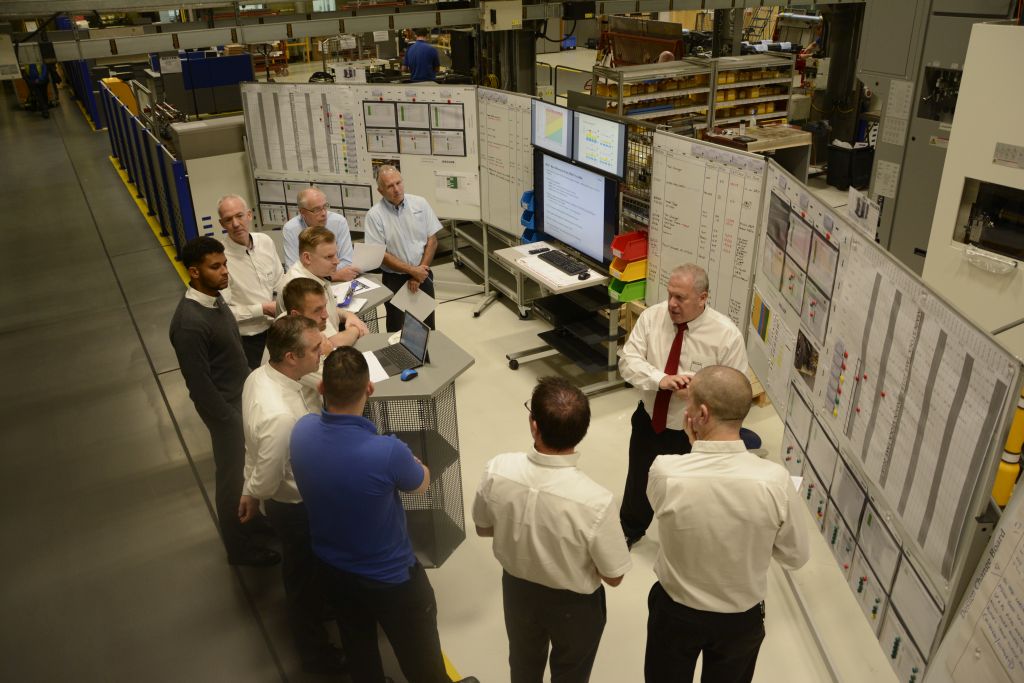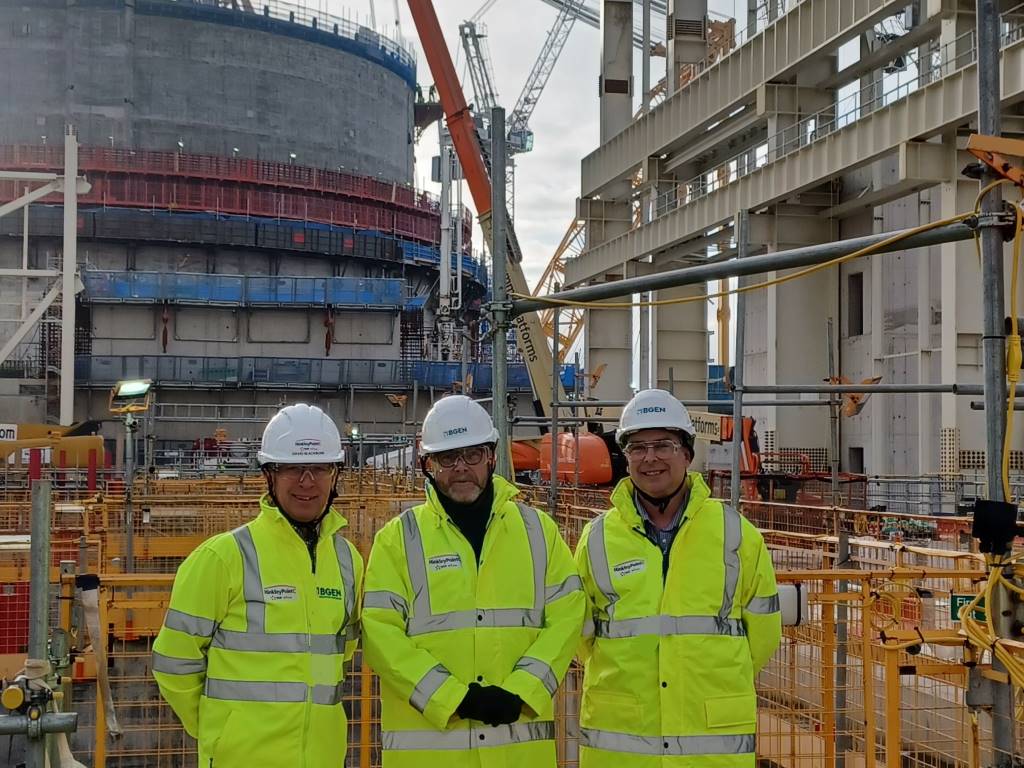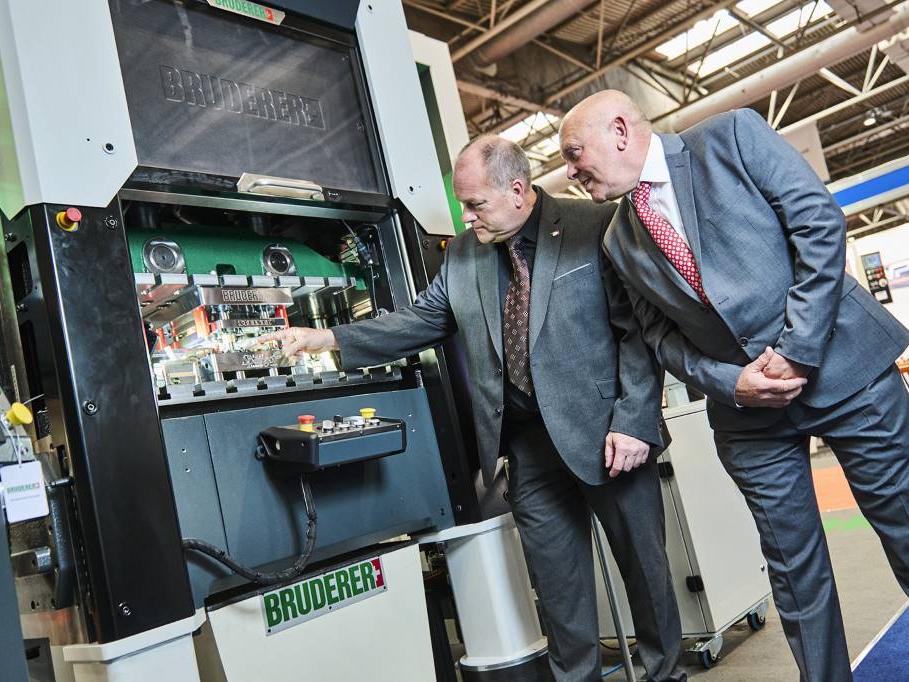November cover story: Go with the flow

As one of only a handful of machine tool builders in the UK, Heller is somewhat unique. Its manufacturing site in Redditch, with its production flowlines, lean manufacturing philosophies and highly skilled workforce never fails to impress, but further recent investments in the facility have really taken things to a new level. Dave Tudor reports.
A company manufacturing machine tools in the UK is a rare breed indeed but with Heller, this has been the case since 1995 when the Worcestershire-based factory was established. Heller UK employs 165 people of which, impressively, 10% are apprentices.
It’s testament to the UK operation – headed up by the affable Matthias Meyer – that the Redditch site has evolved into a ‘Centre of Excellence for Serial Assembly’ for Heller worldwide. 20-25 machines are built at Redditch every month which means it plays a vital role in the Heller Group’s global production strategy.
There are longer term plans in place to extend production at the facility even further: recent news is the announcement that Heller’s HF 3500 and HF5500 5-axis machining centres will be built at Redditch. Production is ramping up as we speak.
Large scale developments across the whole Redditch site represent a £2 million investment. The fully air conditioned open plan office areas are modern, bright and welcoming, managing to successfully combine aesthetics with comfort and functionality without being over-extravagant.
When you walk through the main entrance, it’s immediately apparent that this is a 21st century facility. It’s a similar story in the manufacturing areas – a sizeable chunk of cash has been invested in a ‘Speed Flowline’, designed, installed and commissioned by German transport and handling specialist Strothmann. If any readers have kids sitting on the fence about a career in engineering or manufacturing, get them to visit Heller. This is machine building for the modern age.
Culture club
When Matthias Meyer took over the reins at Heller UK in 2015, he identified two important areas that required immediate attention – how Heller was perceived in the UK by its customers and the culture within the company itself.

“As a business, we were too segmented and disparate,” he recalls. “I’ve always had a very open management style and we needed a way of bringing everyone, including our customers, closer together. The investment in the facility was made with that in mind. Today, we communicate much more effectively internally; we introduced Lean manufacturing methodologies to the business and that involves constantly reviewing our processes and looking for ways to improve what we do.
“That of course needs input from everyone and all our employees have really embraced this way of thinking,” he adds. “Although the process was kickstarted through the installation of the new flowline, the changes within Heller are as much cultural as they are physical.
“For example, one of the things we implemented immediately were daily meetings that take place every morning at 9.00am on the shopfloor. Everyone who has a responsibility for production is involved and takes ownership where necessary – that’s really important. We discuss a multitude of things, from problems that are holding up production through to supplier issues, logistics and ways we can improve our processes. The important aspect however is that we identify – and resolve – problems quickly.
“In terms of reporting, everything is represented graphically on the shopfloor via highly visible ‘live’ progress boards that use a traffic light system. This data is also available digitally via our Intranet but we can see at a glance where any bottlenecks are and what’s being done to resolve them. If I’m in the office, I always attend these meetings personally. It’s all about working together to bring about continuous improvement and being 100% customer-focused. We’re happy to share our main performance KPIs with all employees.”
Falling into line
Heller UK is no stranger to flowline techniques. When I visited the company back in 2015, a five-station mechanical assembly flowline encompassed group assembly installation, media installation, toolchanger installation and alignment, guarding installation, and final cabling operations for Heller’s range of H4500, H5000 and H6000 4-axis machining centres.
However, as part of the recent investment programme, the factory floor has been redesigned to accommodate a second ‘Speedline’ flowline designed by German company, Strothmann. This is for the complete assembly – start to finish – of Heller H2000/H4000 4-axis machines, incorporating a precision rail system to move machines from one station to the next.

This flowline is a much bigger installation with a total of 13 individual stations (meaning up to 13 individual machines concurrently). Stations 1-4 take care of mechanical assembly – machine beds, guideways, ballscrews, pallet changers assemblies, machining units, rotary tables, guarding and cabling. Moving along the line, stations 5-7 are where electrical commissioning takes place and stations 8-13 move the machine through geometry alignment, axis positioning, final inspection (including machining of a test piece), functional testing and endurance, and finally preparation for despatch.
The final six stations are ‘high accuracy’ allowing Heller to move the machines from station to station whilst maintaining repeatable geometric accuracies to a staggering 4µm. At any one time, there’s a single machine, having specific things done to it, on every station. Once the work is complete on a particular machine, it simply moves to the next station for the next stage of build – assuming of course that the next station is clear.
Full flow
Seeing this flowline in action really drives home how vital it is to keep things moving at all times. It’s real just in time manufacturing. Any problems or interruptions in supply will bring a station – and consequently the entire flowline – to a grinding halt. This is why it’s essential for everyone to work together to keep downtime to an absolute minimum and the flow from station to station constant. Everything needs to be in the right place at the right time for this to work – and largely it does. Mr Meyer reports that since the investments were made, the factory is producing machines 30% faster than previously.
With a flowline approach, supplier performance – or lack of it – plays a primary role in the overall effectiveness of the whole process and this is why Heller monitors it closely as a high priority KPI. This could be late deliveries or defective parts.
In more detail, three aspects are measured and reported back to the offending supplier: if lack of supply causes the flowline to actually stop; if lack of supply causes a process deviation; and finally, how much production time is lost until the problem is resolved.
“Once suppliers ‘buy into’ the way our flowlines work, they’re much more aware of how their performance directly affects ours,” Mr Meyer reveals. “It’s important to note that the word ‘supplier’ in this context can also mean other Heller plants.”
Completing the jigsaw and the final part of the shopfloor layout at Heller is the sub-assembly area. Encompassing product ranges H2000/H4000/H4500/H5000 and H6000, this is where components such as setting stations, pallet changers, spindles, columns, tool changers, magazines, drag chains, energy units and pallet changers are pre-assembled ready for the flowlines. Not all sub-assemblies built at Redditch are for its own use however. Chain tool-type magazines for example are built and then exported for use at other Heller sites worldwide.

“It’s important to point out that, wherever possible. all parts used in the build of Heller machines are manufactured on Heller machines,” Mr Meyer emphasises. “In this way complete integrity is maintained throughout the entire process.”
Frictionless borders
To many manufacturing companies, the trade deal aspect of Brexit is of obvious importance but to Heller perhaps more so because it imports parts into the UK and exports finished machines out. Heller not only produces machines for the home market – it also supplies machines to European customers and other Heller sites.
“In a typical week, around seven full truckloads of component parts arrive here which feed our two flowlines and five to six trucks containing fully completed machines leave the site bound for customers in the UK and overseas with many in Europe. Maintaining frictionless borders and favourable trading conditions are absolutely vital to our business,” Mr Meyer states.
Digital transformation
Digital manufacturing is always near the top of the agenda for Heller and its Industry 4.0 offering – Heller4Industry – is designed to provide maximum machine availability whilst ensuring full process control. Essentially for machine owners, the objective is to predict and prevent failure before it actually happens.
Since the advent of Profibus architecture, machine tools, via sensor technology have been capable of producing vast amounts of operational data, but the problem now is that the sheer quantity of data has become so vast, the machine tool’s CNC alone is unable to process it without having a serious impact on machine performance.
In these situations, a separate PC for handling the data is essential and with this in mind, Heller has cooperated with Siemens and developed an edge computer (housed in a small box) called Sinumerik-Edge to manage all this data. Some will be retained and analysed internally within a company’s network or Intranet); whilst other data can be shared in the Cloud via Siemens’ neutral (but secure) Mindsphere platform.
“Customers needing to process large amounts of data will definitely need the extra power, capacity and security offered by the Sinumerik-Edge box,” Mr Meyer advises. “Heller has its own platform suite – Heller4Industry – which comprises Heller4Services – focusing on areas such as machine maintenance, ballscrew wear, spindle characteristics and temperature; Heller4Performance which is much more centred on performance and process optimisation via the analysis of real-time operational data; and Heller4Operation – which is an easy-to-use, operator-orientated user interface for Heller machines.
“This is a slow burner as companies get to grips with the real benefits that connected manufacturing can offer, but the signs are encouraging,” Mr Meyer concludes. “We have two or three UK customers that are showing a keen interest in implementing our Heller4Industry platforms.”
Heller https://uk.heller.biz














